 | Maternal health | UNFPA launches Mobile Maternity Clinic in Kismayo In September, UNFPA Somalia, in partnership with Jubaland State Ministry of Health, launched the Mobile Maternity Clinic (MMC) in Kismayo thanks to generous support from the Government of Ireland. This MMC will provide reproductive health services to pregnant women and mothers in the Dalxiiska IDP camp and its surroundings, where such services were previously lacking. Community leaders expressed gratitude for the new maternal health clinic, emphasising its accessibility and potential to safeguard the health and save the lives of pregnant women. UNFPA Somalia is committed to strengthening maternal, newborn and reproductive healthcare services across Somalia, and the MMC in Kismayo represents a significant step toward this goal. | |
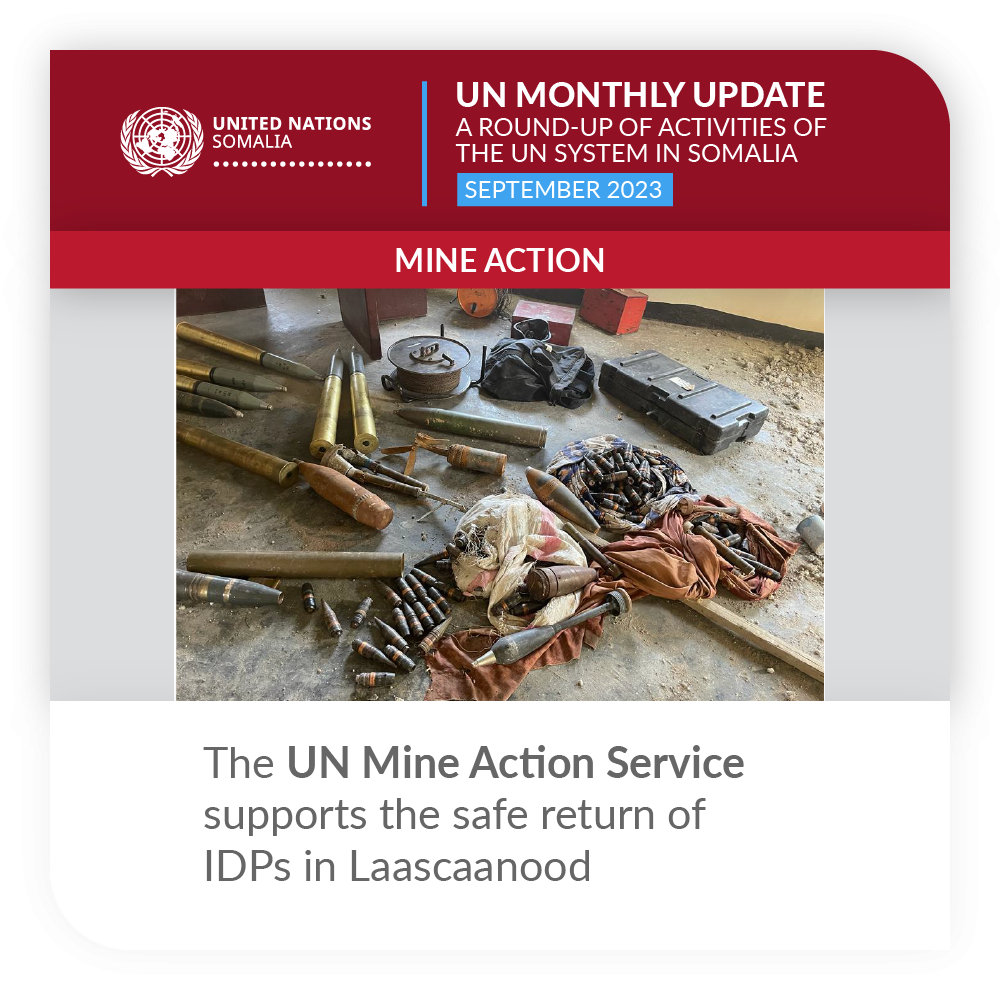 | Mine action | The UN Mine Action Service supports the safe return of IDPs in Laascaanood Following the conflict, a number of unexploded ordnances were reported in Laascaanood, posing a risk to the civilian population. Between 8 and 16 September, three accidents were reported, claiming the lives of three children and injuring nine others. Responding to this situation, the UN Mine Action Service, in coordination with the Protection Cluster, organised in Garowe on 16 September explosive ordnance risk education training of trainers for frontline responders deployed in the Sool Region. A total of 50 Government and NGO workers benefited from the course and were equipped with portable audio risk education devices and leaflets to increase the reach of awareness messages. At the same time, an explosive ordnance disposal team of the Somali Police, previously trained by the UN Mine Action Service, was deployed to Laascaanood. As of 22 September 2023, over 300 unexploded ordnances were cleared. | |
 | National ID system | UNDP supports Somalia’s first digital national ID system With the support of the Somalia Joint Fund, UNDP has strengthened the National ID system, focusing on making enrolment more inclusive to advance the state-building process in Somalia. This month, UNDP facilitated a national ID summit, marking a significant milestone in developing Somalia’s National ID ecosystem. During the national ID conference in Mogadishu, Somalia's National Identification and Registration Authority unveiled a new biometric identification system that will enable the government to provide a secure and universally recognised form of identification to 15 million Somali citizens over the next four years. | |
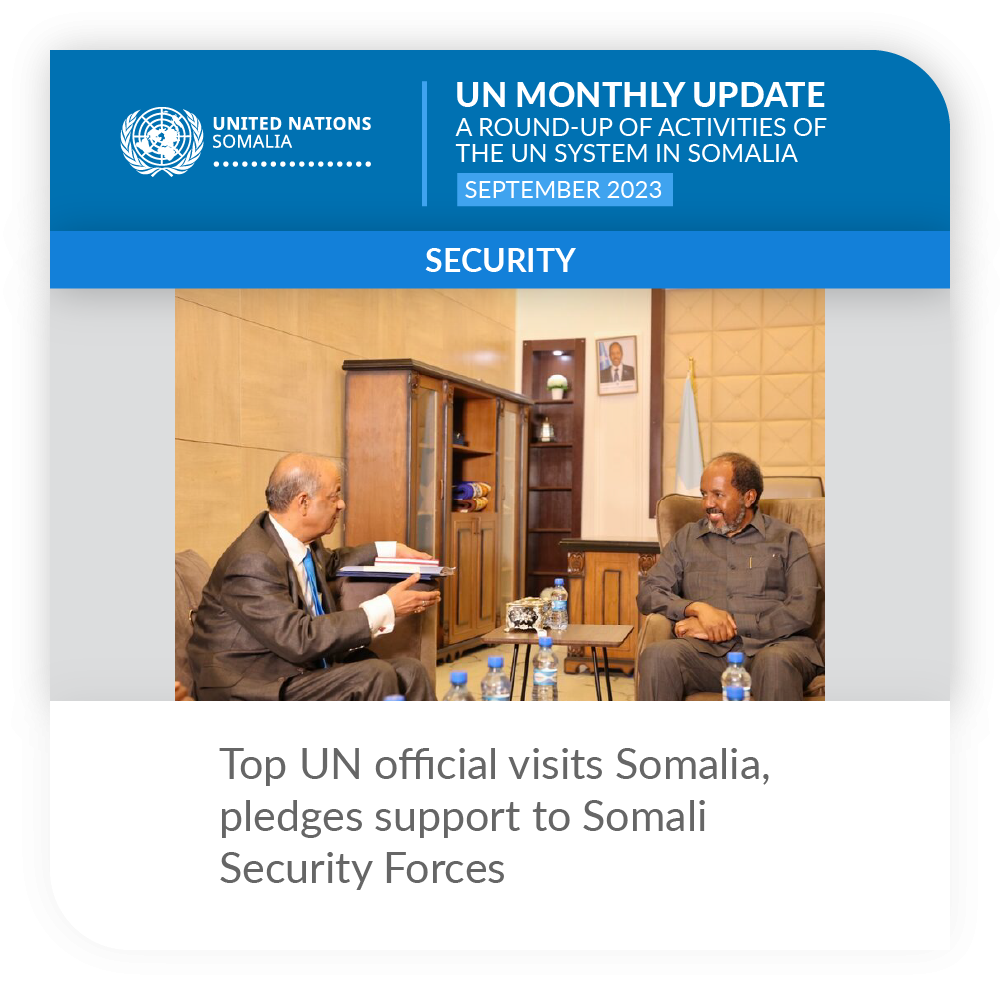 | Security | Top UN official visits Somalia, pledges support to Somali Security Forces The United Nations Under-Secretary-General, Atul Khare, ended a four-day visit to Somalia with a pledge that the United Nations Support Office in Somalia (UNSOS) would do all in its power to ensure the Somali Security Forces (SSF) are able to take full control of security responsibilities as African Union peacekeepers gradually withdraw. USG Khare stressed that for a successful transition to be achieved - as envisaged by the AU and the UN - SSF must take over full security responsibilities from the African Union Transition Mission in Somalia (ATMIS) with the help of UNSOS. | |
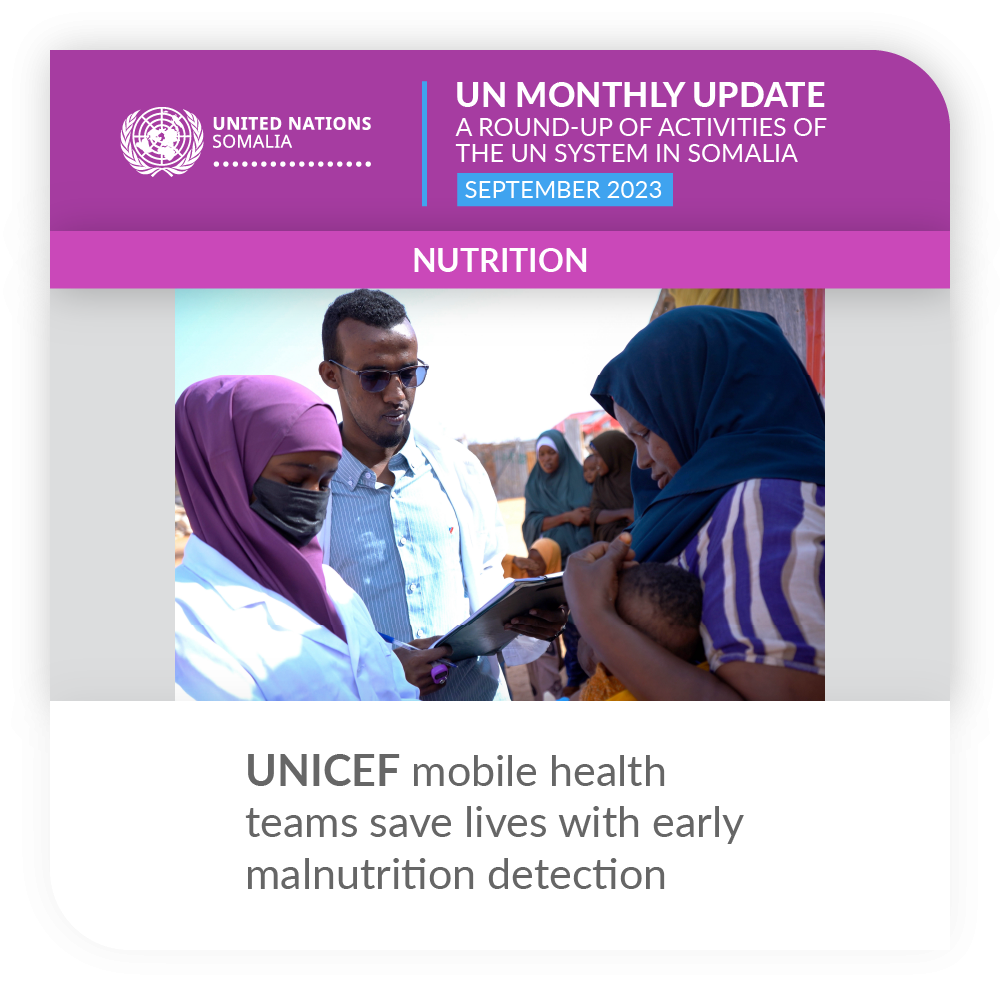 | Nutrition | UNICEF mobile health teams save lives with early malnutrition detection As unpredictable and extreme weather is affecting Somalia, dedicated frontline health and nutrition workers are in action with immediate life-saving responses to the 1.5 million children expected to need treatment for malnutrition through the end of this year. UNICEF is supporting the Federal and state ministries of health and partners to strengthen nationwide health systems where malnutrition is highest to enable families to stay in their communities and build resilience while saving lives. This year, UNICEF and partners have treated around 380,000 children for severe acute wasting in 70 districts across Somalia. This is through the UNICEF-supported mobile clinics run by dedicated frontline workers. UNICEF also works with the Federal and state ministries of health to scale up the treatment of children with waste and integrate it within routine primary healthcare services. | |
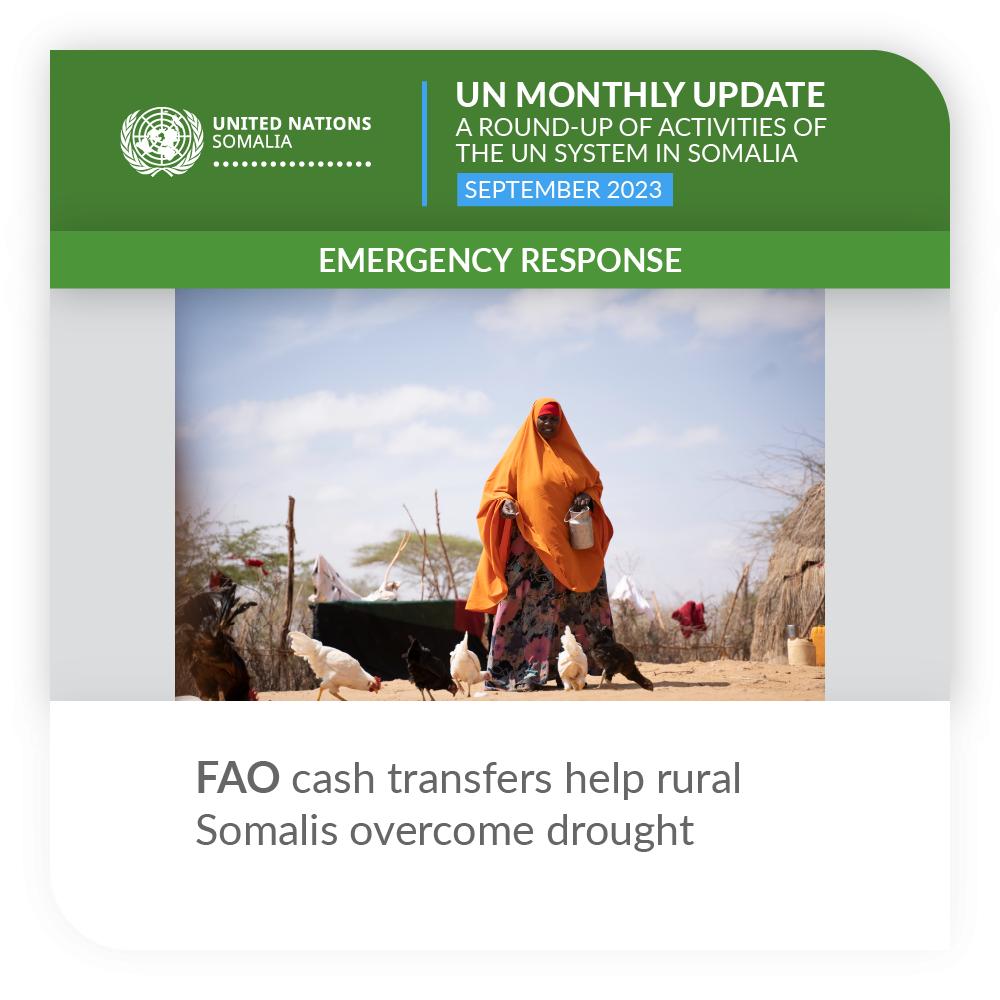 | Emergency Response | FAO cash transfers help rural Somalis overcome drought In Somalia, drought is a constant threat to rural families. But thanks to cash transfers from FAO, rural families in the Luuq district are able to meet their most critical needs, such as food and water. This support means that these families no longer have to sell productive family farming equipment or cut down trees for firewood, which would damage the environment and make it harder to recover when the drought ends. With support from USAID and FAO, over 777,000 people in Somalia have received emergency cash transfers, reducing the risk of displacement and hastening recovery. This is just one example of how FAO is working to help rural Somalis build resilience to drought and other shocks. | |
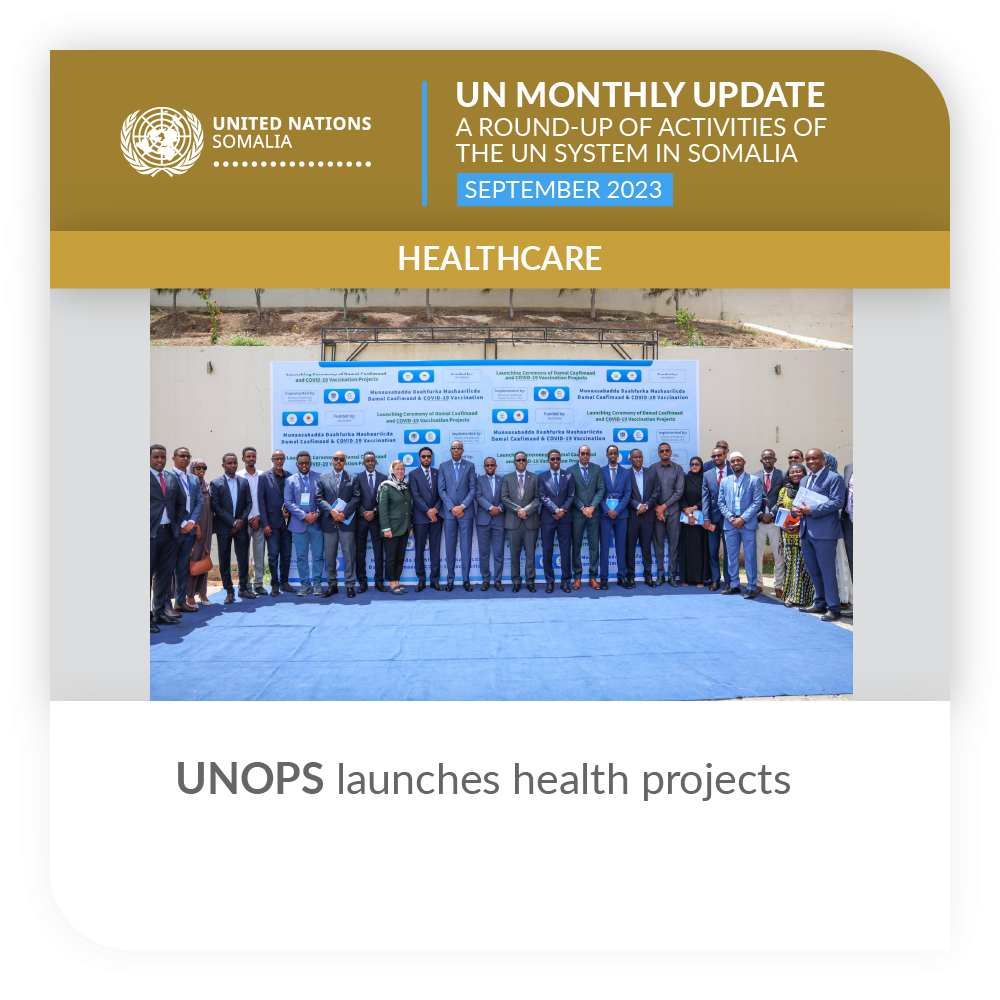 | Healthcare | UNOPS launches health projects UNOPS, in collaboration with Somalia and the World Bank, launched the Damal Caafimaad Project and the COVID-19 Emergency Vaccination Project. UNOPS exclusively oversees the COVID-19 Emergency Vaccination Project valued at $12.5 million, focusing on renovating six regional hospitals. These efforts encompass upgrading healthcare facilities and integrating climate resilience measures like flood prevention, wind-resistant structures, and passive cooling systems. Strengthening healthcare infrastructure and bolstering emergency response capabilities ensures consistent delivery of critical health services to vulnerable Somali communities. | |
 | Security Council briefing | UN Special Representative briefs the UN Security Council on Laascaanood On 7 September, SRSG Catriona Laing briefed the UN Security Council on the situation in Laascaanood. The SRSG condemned the escalation in violence on 25 August and reaffirmed the necessity for an immediate and unconditional ceasefire to enable dialogue and the resolution of disputes through peaceful means. The SRSG confirmed her engagement with all parties on several occasions, both in person and by telephone, including an in-person visit to Hargeisa for discussions with President Bihi, senior officials and civil society representatives. The SRSG repeated the call for all parties to abide by human rights and international humanitarian law, including in relation to civilians, civilian infrastructure, the treatment of detainees and humanitarian access. | |
 | Capacity Building | UN-Habitat contributes to improved local governance In September, UN-Habitat worked with local leaders across Somalia, offering various trainings, ranging from internal audit, Accounting Information Management System (AIMS), Billing Information Management System (BIMS), and conflict management. A total of 129 local leaders have been trained in the past month. Through its Joint UN Programme on Local Governance (JPLG), UN-Habitat helps improve service delivery and good governance. | |
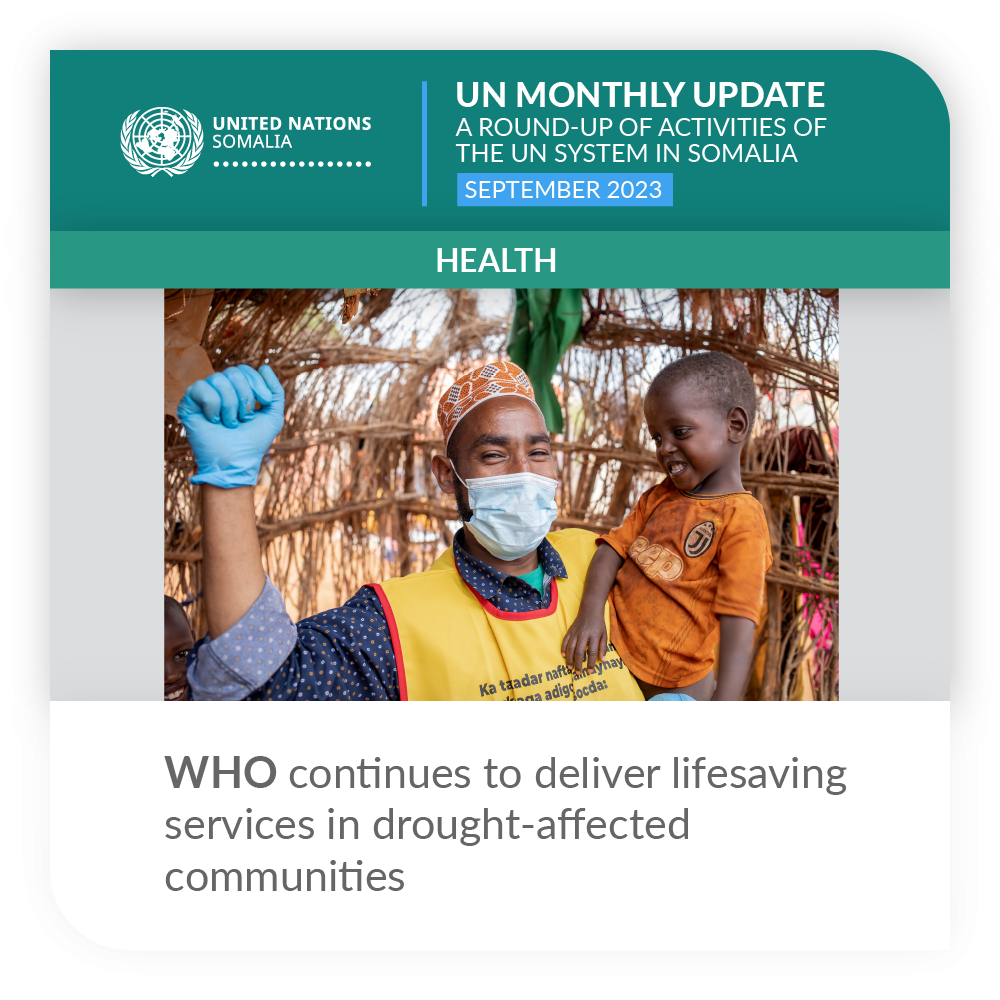 | Health | WHO continues to deliver lifesaving services in drought-affected communities In September, WHO continued to deliver lifesaving services to affected communities through community-level interventions and is actively engaged at the health cluster level in flood risk mapping and preparedness efforts for the upcoming El Niño. While the country was in the midst of a rapidly evolving health crisis, the greatest urgency was to reach the most vulnerable (women and children especially) in Somalia with health care that had the ability to protect from the cascading effect on the health of acute hunger and starvation. WHO deployed community health workers (CHWs) in drought-affected districts. The CHWs reached out to every household possible in the underserved, hard-to-reach access, constrained communities of these districts and bridged the gap in access to health care between these communities and the health systems, bringing health services close to the people. | |
|
A round-up of activities of the UN system in Somalia in September 2023
- 01 October 2023
- Top Stories
- Newsletters and Round-ups of UN Activities






